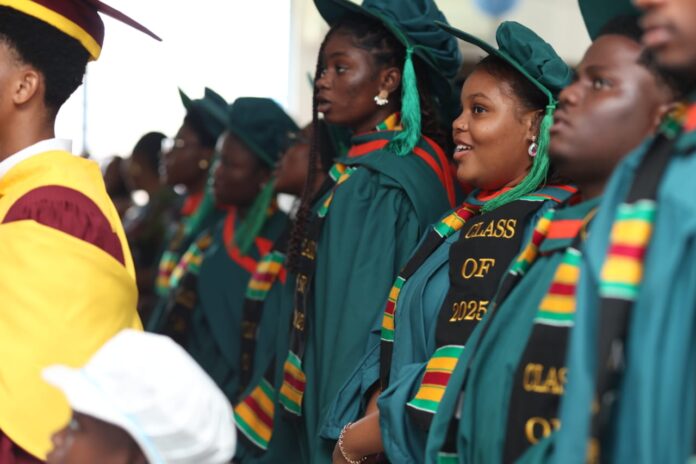Startrite Schools’ 18th Graduation and Awards ceremony, held on July 19, 2025 at its New Bortianor campus (near West Hills Mall), went beyond the usual pageantry of caps and gowns to sound an urgent alarm on a silent yet growing threat—screen addiction among children.
In a keynote address delivered by Mrs. Lilian Annan, Director of Nursing Services at The Trust Hospital and a seasoned Risk Management Consultant, the audience of parents, educators and young graduates was urged to confront the rising overdependence on digital screens among children with urgency and resolve the negative effects.

Held under the theme “Screen Addiction: Signs, Effects and Reversal,” the event served as both a celebration of academic achievement and a call to action.
“We live in a digital world, no doubt, and screens are everywhere—phones, tablets, computers, TVs, and gaming consoles,” Mrs. Annan said, adding that these devices, once merely tools, have become ever-present companions, even supplanting traditional parenting and teaching aids.
Referring to a 2023 study by the University of Ghana, she cited alarming findings: children under five who were exposed to more than two hours of screen time daily showed delayed language development and decreased social engagement, especially in urban settings such as Accra.

How screen addiction happens:
Mrs. Annan explained that screen addiction goes beyond liking games or videos. It becomes a compulsion that disrupts health, learning, and social interactions.
She observed that while many parents are not ignorant of the issue, they have grown too dependent on screens to occupy children—often starting as early as infancy.
“We don’t sing lullabies anymore; we don’t tell bedtime stories anymore,” she lamented. “What happened to these beautiful cultural practices?”

Recognising the signs
She outlined several behavioural red flags that point to potential screen addiction:
• Irritability or anger when screens are taken away
• Loss of interest in hobbies and outdoor activities
• Neglected responsibilities, such as homework or personal hygiene
• Poor sleep due to sneaking devices into bed
• Declining academic performance due to fatigue and lack of concentration

The Effects: More than meets the eye
Mrs. Annan enumerated a wide range of consequences stemming from excessive screen use:
- Developmental delays – including speech and vocabulary issues in early childhood.
- Mental health risks – such as anxiety, depression, and sleep disorders.
- Physical health challenges – including eye strain, headaches, obesity, and poor posture.
- Social withdrawal – leading to tantrums, poor emotional regulation, and weakened family bonds.
- Academic decline – due to reduced attention span, procrastination, and missed assignments.
She also pointed out that digital devices had increasingly replaced books and hymnals even in places of worship, indicating how deeply embedded screen culture has become.
Reversing the trend: Practical solutions
Despite the gravity of the issue, Mrs. Annan emphasised that screen addiction is reversible and offered several remedial measures:
• Create Screen-Time rules: Limiting recreational screen time to 1–2 hours and enforcing screen-free zones at home and in school.
• Encourage outdoor and creative activities: Promoting sports, reading, music, gardening, and family outings.
• Model digital discipline: Parents and teachers must lead by example in limiting their own screen usage.
• Introduce digital detox days: Instituting screen-free Sundays and tech-light evenings.
• Teach digital literacy: Empowering children to use technology for learning, not just entertainment.
• Involve children in the process: Letting them set screen-time goals and take responsibility for their digital habits.

A message to the graduates
Turning directly to the graduating students, Mrs. Annan said, “You are the future, not your screens. The phones and game consoles in your hands are powerful, but you are more powerful.”
She encouraged them to talk to their parents, play outside, read, and dream big—reminding them that their brains are the greatest tools they will ever own.
Mrs. Annan challenged parents and educators to be present in the lives of their children and wards and to listen more and create “homes and classrooms where curiosity and conversation flourish more than clicks and likes.”
“Screen addiction is real, but it’s not unbeatable,” she said, urging a collaborative effort to raise tech-savvy but emotionally balanced and healthy children.
“Let us raise children who use technology safely—not children who are used by it,” she counseled and pointed to how useful and powerful technology is as a servant but a dangerous master.
The event was well-attended by parents and other dignitaries such as Mrs Alice Quartey, the managing Proprietress, Prof. Peter Quartey, the executive Director and Prof. Tweneboah-Koduah, the Chairperson.
DISCLAIMER: The Views, Comments, Opinions, Contributions and Statements made by Readers and Contributors on this platform do not necessarily represent the views or policy of Multimedia Group Limited.
DISCLAIMER: The Views, Comments, Opinions, Contributions and Statements made by Readers and Contributors on this platform do not necessarily represent the views or policy of Multimedia Group Limited.


